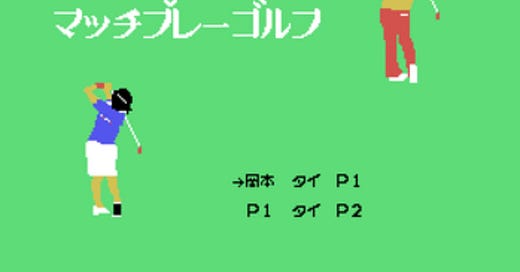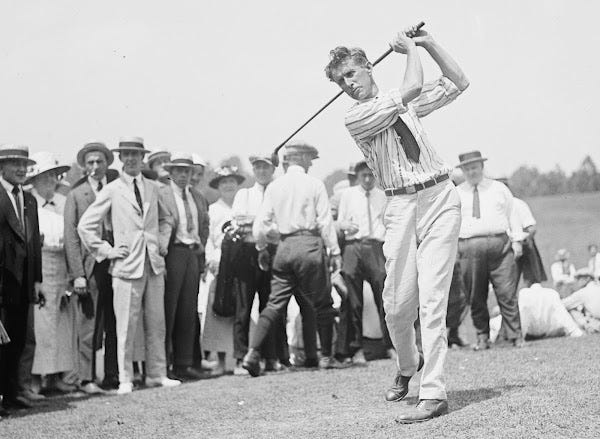Match Play Is Better Than Stroke Play
This woefully underrepresented format should be the standby for the high-handicapper. It is simply a better format for celebrating success instead of punishing failure.
Stroke play is generally considered the standard for playing golf. It’s how we measure ourselves against others. It’s how we run the majority of our competitions. It’s the current iteration of golf itself. It may seem odd that I would write about match play specifically in a series of essays that are supposed to be an analytical approach to golf. There isn’t anything wrong with stroke play, per se, though, I want to argue here both that its objectivity is generally overstated, and that match play is better suited to the human experience in general.
Starting out, human experience is subjective. If I say “X is more fun than just winning” some might simply respond, “winning is fun.” That’s not the type of debate I want to have here, but I do want to presuppose that there is something inherently flawed with stroke play for the average golfer. Don’t take my word for it. Here’s economist and author Steven Levitt’s analysis of stroke play:
I think golf would be a whole lot more fun for the average golfer with one simple change to how we keep score. Rather than adding up strokes, I would count scores differently. Golfers would get 15 points for an eagle, that’s two under par on a hole, eight points for a birdie, three points for a par, one point for a bogey, and zero points for a double bogey or worse.
Let me say that again just to be sure you caught the scoring system. Zero points for a double bogey or worse, one point for a bogey, three points for a par, eight points for a birdie, and 15 points for an eagle. A higher score, obviously, is better. Now, why do I like this way of scoring? First, because it rewards taking chances. With traditional scoring two pars count the same as a bogey and a birdie, or the same as a double bogey and an eagle. But in my scoring system, two pars are only worth six points, whereas a bogey and a birdie are worth nine points, and an eagle and a double bogey, well, they’re worth 15 points.
So with my scoring, it makes sense to take crazy chances with the hope of pulling off a miracle. And I suspect you’ll find that’s a fun way to play. Just as importantly though, this way of scoring focuses your attention on your best holes and lets you forget your bad ones. Let’s say you play nine holes and you make eight triple bogeys and one miraculous, awe-inspiring birdie. With traditional scoring, you’re 23 over par and probably quite unhappy. With my scoring, you have eight points. That’s pretty good. All from that wonderful birdie.
The birdie sticks in your mind. All the disaster holes fade from memory just as they should. Another good feature of the scoring system? When you’re having a bad hole, you can just pick up and move to the next hole, speeding things up. One nice feature of my idea is that it doesn’t require changing golf courses or equipment or anything else. You and your friends can make the change tomorrow and nobody can stop you. Try it. And if you do, let me know how you like it.1
I respect Steven Levitt’s analysis here, but I reject his conclusions. Levitt’s method (an exaggerated form of modified stableford) promotes taking chances over playing it safe, but players at the end of the round will still see their strokes. This feels invalidating, and trust me, I’ve played plenty of modified stableford rounds.
Playing net-match is different. It gives you all the benefits of “going for it” without any of the loss of verisimilitude of using an arbitrary point system instead of counting strokes. The important distinction between the two, is that match play doesn’t reward taking chances, per se. Instead, it allows the game, itself, to dictate when to take chances. Match play nudges the player, in some moments, toward taking shots they wouldn’t normally attempt. Since each hole is scored discretely, when your opponent has a huge advantage, there is no real upside to every playing it safe. Has your opponent placed a good shot near the hole? Best go for the pin rather than laying up. However, if your opponent shanked their drive into the woods, all the better for you to play it safe.
Match doesn’t reward risk-taking, it only facilitates it. Match doesn’t treat failure harshly, but it still punishes it. This adds asymmetric strategy. It adds the ability for players to effectively force shots from opponents they’d likely not otherwise play. It is a more strategically flexible game. Additionally, when you win, you’ve won something real, you’ve defeated your opponent in holes won, not in arbitrary points.
With stroke play, psychologically, round-ending mistakes are devastating. When rounds for moderate handicappers often include a few holes with 8, 10, or even more on the card, many of these “blow up” holes will be unrecoverable. If I’m playing against someone, after such a blow up, I feel I must root for my opponent to fail, which is never fun. It bums me out. It’s unpleasant. I want to win by my own triumph, not by the failure of my peers. The typical suggestion to alleviate this is a stroke limit, again however, this strains verisimilitude. With a stroke limit, if my opponent comes back to win, it always feels illegitimate. In contrast, match play allows a kind of second-chance in a way that stroke play cannot.
Finally, there is weather. Inclement weather can be ruinous to a round of stroke play. Nobody wants to put up a 10 because they send two drives out-of-bounds in a strong crosswind. I think it’s arguable that the effects of inclement weather on stroke play is what has launched parkland-style courses above links-style courses in golf culture, so much that links golf is effectively a niche style. Match play completely removes this barrier, it makes golf a desirable game in any level of wind, because again, you can make many, many errors, and still win a match handily.
Downsides of match play:
Now that I’ve made my case, let’s look at the downsides. What’s the biggest downside? Bye holes. Most golfers have never heard of a bye hole, much less needed one. A bye hole is a punishing 19th hole, almost always a par 3, to settle ties. The idea is to make it so challenging, that players will likely end with worse than par, and be more likely to break their tie. Bye holes have no stroke index, nor are they included in the rating or slope of the course. However, many golf courses see a 19th green as something not worth maintaining, and I understand why. Most want to “get their money’s worth,” and treat the 19th green with as much wear and tear as the rest of the course. A bye hole, however, should be punishing enough as to not be desirable to play unless necessary. While there are other ways to resolve these disputes, none is as satisfying as a bye hole. When I play and no bye hole is available, we just the lower stroke play score split ties. Our bet is usually simply determining who pays for the first round anyway, so it’s no big deal.
Another major concern is that match play is two players, however, this is resolved simply by playing a skins game (effectively match play for 3+) or a rabbit (another 3+ match play variant). Another option, though many of the direct strategic elements are lost, is that foursomes can simply play multiple matches against each other simultaneously. You may win two, and lose one in the same round, but it’s still a fun way to play.
Also, it’s fair to point out that match play is entirely impractical for club tournaments. There are obvious reasons why we play stroke play when we have a field of dozens of people, and I don’t mean to take away from stroke play’s usefulness in competitive golf. I just see it as a match play as a superior format for casual golf.
Furthermore, match play games usually end early. Stroke is always settled on the final green, so you can never get comfortable. This is a virtue of stroke play, and it also matters in course design insofar as where and when to put the highest stroke index for optimal match play.
Finally, stroke play is needed to calculate handicap. When I say “I play match,” I still mean casual match play. That is, I always finish the hole, and count my strokes as I would, always finish the round, etc.
But stroke play is better because it’s a more fair/universal measure of skill:
I just want to respond briefly to what I see as common push-back to my arguments.
Is stroke play useful as a consistent measure of skill? Ehh… not really. Every day we generally see different conditions, hole locations, and tees. It is almost certain that most course records were set during periods of ideal course conditions that are rarely replicated. Tailwinds on the most challenging par 5s, calm near the most dangerous greens, ideal pin positions. Variability is built into the game. Stroke play tries to pretend the game is invariable. The USGA’s adoption of playing conditions calculation is testament to this.
Ultimately, we are talking about a recreational game. We play because it’s fun, and this question of why we play should always be central. Why do we play on a course vs a simulator? Why don’t we play on a flat, empty field? We are adding randomness into the game, not trying to make the game about who’s swing is more perfect. We ought to keep the fun of shot-making, taking chances, and going for glory front and center by leaning more into playing match play, and taking a less serious view of stroke play for day-to-day rounds.
I write here to promote golfcourse.wiki, a site dedicating to mapping and promoting smaller public and muni courses, and sharing local advice for free. If you want to share your favorite course, sign up and start editing today. If you liked this article, join the discussion on the golf subreddit.
Source: People I (Mostly) Admire







I almost exclusively golf in a stroke play format and, as such, have adopted a quite conservative approach to the game. Even as a mid single digit, I very rarely make birdies or better and almost never make double bogeys or worse. I feel like my goal is typically to survive golf holes and avoid disaster rather than "attack" them. I imagine I would play differently if I played match play or stableford, especially against a player of equal skill but maybe had a touch more aggression about them.